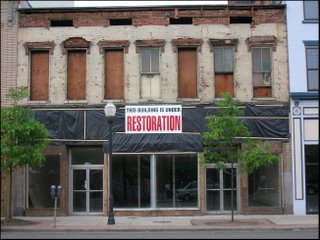Heart Songs
We went to our older son's band concert last night. One moment to brag, and then I'll get on with it. He played in three of the bands -- both 7th and 8th grade (as a 7th grader) and in the jazz band. He also won an Outstanding Band member award.
The band director for our middle school bands is a great teacher. Some of the parents got together and nominated him for the Teacher of the Year award. The winner of this award hasn't yet been announced, but in order to say "thank you" for all of the extra hard work that this teacher does, the jazz band parents contributed to a gift certificate for him (under the grand planning of our own Anita). Vinny stood up last night and thanked Mr. Kerr, and gave him the gift. What happened after that was truly stupendous. All three bands, and the entire section of bleachers with all of the family members stood up and applauded. Gratitude filled the room. Wow. Once it died down, Mr. Kerr stood at the microphone and thanked everyone. He told the room that he couldn't do what he does without great kids and their great parents. Humility and class -- I hope he wins the award.
As we listened to them play their instruments last night, and as I think about it this morning, I am reminded how important it is to the sound that the band makes that every section of instruments sounds different. Hopefully, everyone plays either the same notes or ones which harmonize, and at the same pace, but the resulting music itself would be very flat indeed if each child played the same instrument on the same note. It would be loud, but it would not have any of the depth or fullness that the cooperative sound has.
Its a well-worn analogy, isn't it? Tired and overused. I think the reason that this particular analogy -- a band with many instruments, making music -- is that everyone recognizes the truth of it. We all agree with this kind of metaphor. We all understand that everyone has a different gift, and that together, we can make beautiful music.
Why is it then that we cannot accept that we all have different needs?
Our church is working its way through the Natural Church Development process. As part of this effort, we have a coach from a different church who comes in and helps us to implement the necessary steps to achieve our goal. Our coach is Dr. Randy Flanagan. He was running a focus group the other night, and was discussing how different people like different kinds of music in church. He said, "We all have a different heart song." Wow. This is so true, and doesn't just apply to our musical tastes, does it?
We all have different heart songs.
If we believe that God equips us all with different gifts, and that we all sing different notes in life, then why doesn't it follow in that kind of logic, that we all have different needs in worship? How could we ever say that one way -- traditional, contemporay, praise -- is better than the others?
We all have different heart songs.
There is a church in Lexington -- it's United Methodist -- that doesn't do different types of services at different times. They offer several services, but each one is identical. Their theory (which is better explained at this link) is that they will offer some of every type of worship at every time period so as to avoid dividing their congregation into segments. I don't know if this is the answer or not, but I think there might be some wisdom in this. At least in this kind of setting, we would all have the opportunities to experience everything -- maybe our heart songs might be heard in surprising ways, when we least expect it. I kind of think that this system might also make us all more accepting of those who have different needs than us.
We all have different heart songs.
I think that the acceptance of this statement -- that we all have different heart songs -- leads us to one of our real missions. When we can down-grade our own needs and upgrade the needs of others, then we are loving them. It is an act of love to say to someone with your actions, "I don't like praise music, but I know that it brings the Word of God into your life, so, if necessary, I'll not only listen to it, I'll even sing it for you." When we can get to that point, the kind of music won't even matter. It will be our heart songs that are creating the worship.




















